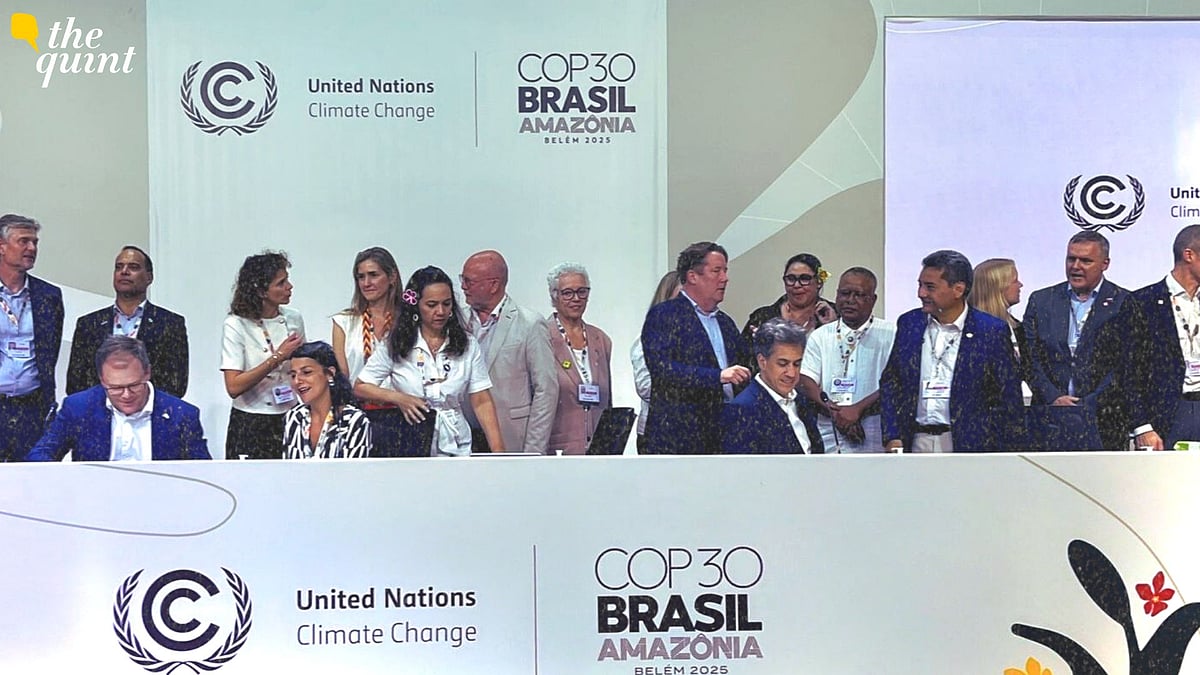COP30: Small and Big Nations Turn Up the Heat on Fossil Fuels As the Clock Ticks
“Our position is clear. We're not a part of this right now, but things change," an Indian observer told The Quint.

advertisement
COP30 is living up to the usual heightened drama seen in the second week when climate negotiations begin at the level of ministers and heads of state.
At 2 pm on Tuesday, 18 November, the air at the ‘Blue Zone’ of the expansive venue in Brazil’s Belém changed as a group of ministers walked onto the stage in a packed room of journalists to talk about something that’s not one of the formal agenda items: To include a roadmap to phase out fossil fuels as part of the final text at COP30.
At least 20 countries are part of the coalition, and as many as 82 countries are throwing their weight behind them, The Quint has learnt.
Delegates from six countries—Marshall Islands, Germany, Colombia, Kenya, the UK, and Sierra Leone—addressed the gathering as the other representatives from different countries stood behind them in a show of solidarity and strength.
(Photo: Shelly Walia/The Quint)
A representative from Marshall Islands, who opened the press conference, said there were two reasons behind the “multirão call” for the roadmap. One of the buzzwords at COP30, “multirão” in Brazilian Portuguese, essentially refers to the spirit of collective effort.
"Secondly, the best chance of landing an agreement at this COP is in the multirão package. And the current reference in the text is weak—and is presented as an option. It must be strengthened and should be adopted,” Stege added, addressing the room.
Stege was referring to the first draft of a possible COP30 deal, titled "Global Mutirão: uniting humanity in a global mobilisation against climate change", which mentions the roadmap to help countries implement phasing out of the use of fossil fuels as an optional inclusion. The nine-page draft agreement was released earlier in the day on Tuesday after UN climate talks stretched late into the night.
“This is a global coalition of the Global North and the Global South saying with one voice that this is the issue that cannot be ignored, that cannot be swept under the carpet, and this is where the momentum is,” added Ed Miliband, Secretary of State for Energy and Climate Change of the United Kingdom, said at the press conference.
“We have an opportunity over the coming days to make COP30 the moment that we took forward the global transition away from fossil fuels building up the work that of COP28,” he added, referring to the pledge made in Dubai to "transition away from fossil fuels in energy systems, in a just, orderly and equitable manner."
How The Calls for a Roadmap Grew Louder
The unexpected political support behind transitioning away from fossil fuels began in the first week of COP30 when Brazilian President Luiz Inacio Lula da Silva, addressing world leaders ahead of the UN climate talks, called for a more concrete plan to "overcome dependence on fossil fuels."
The Quint has learnt that, throughout the past week at COP30, coalition members had been urging other nations to formally join their ranks. Tuesday’s press conference may well also shift that effort into a new gear. Also, not all nations are likely to back proposals that set fixed timelines for phasing out fossil fuels, but there’s a growing pressure for countries to provide “roadmaps” of their progress toward that objective—reports that could be assessed as early as next year’s COP.
Where India Stands
Comprising 20 member nations, this new coalition represents one-tenth of the nearly 200 countries attending COP30. India is not on the said coalition so far.
“India should be, but it isn’t there,” said one of the ministers who was present on the stage but spoke to The Quint on condition of anonymity.
In response, an observer from India, who did not wish to be named, told The Quint, “Our stated position is very clear. We are not a part of this right now. But things change."
They added, "This isn’t a part of the formal agenda, but now with the call to change that, and for the phase-out roadmap to become part of the final text, anything can change.”
Last week, the annual Global Carbon Budget report had revealed that global fossil fuel emissions are set to hit a new high in 2025, adding that curbing warming under 1.5C would now be essentially "impossible".
This is a developing story, and will be updated as more details become available.
(The Quint is in Belém to help you stay updated on the crucial climate talks. Become a member to support our coverage.)